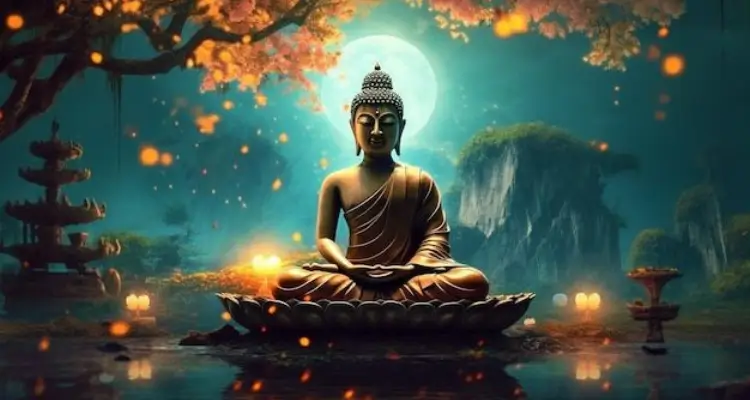The concept of Karma, widely recognized in the modern world, has its roots in various spiritual and religious traditions. In Buddhism, Karma literally means “action,” and every action we perform generates consequences, whether positive, negative, or neutral. These consequences are not limited to a single lifetime but extend throughout our spiritual journey, influencing our destiny and the events we experience. Therefore, Karma is more than just luck or chance: it is the direct reflection of our actions and intentions in the world.
However, the word Karma does not hold the same meaning in all traditions. In Jainism, for example, Karma is viewed as a physical substance that accumulates and affects the person’s well-being. In Christianity, although the concept of Karma is not central, a similar idea exists with the notion of “reaping what you sow,” where good actions lead to rewards and bad actions lead to punishments. In Hinduism, Karma is linked to the cycle of reincarnation, where our actions determine our next life. While the concept is addressed differently, the core idea that our actions have consequences remains consistent.
In Buddhism, Karma is more deeply understood as the set of actions that generates effects on our being and environment. The main difference in Buddhism is the emphasis on the intention behind the action, not just the action itself. For Buddhism, Karma is not something that accumulates in an unchanging or eternal entity, but rather a wave of energy that shapes our present and future experiences, creating new opportunities and challenges.
In this article, we will explore the concepts of Karma, Karma Vipaka, and Karma Veda, with a focus on the Buddhist perspective. We will understand how these concepts interrelate, how they impact our daily lives, and how we can use this understanding to live more consciously and responsibly. The goal is to provide a clearer view of the role of Karma in our destiny and how it offers us the chance for transformation and spiritual growth.
What is Karma?
Karma, in the Buddhist context, is a fundamental concept meaning “action” or “doing.” Every action we take, whether physical, verbal, or mental, generates a consequence. In Buddhism, there is no such thing as an action without a result. The actions we perform, whether good or bad, shape our present and future. Karma is, therefore, intrinsically tied to the idea of cause and effect: what we sow, we reap.
The consequences of Karma can be categorized into three main types: positive, negative, and neutral. Positive Karma occurs when our actions are driven by good intentions, such as compassion, generosity, and kindness. Such actions result in beneficial experiences and outcomes for us and others. Negative Karma is the opposite: when our actions are driven by selfishness, anger, or desire, they bring suffering to ourselves and others. Neutral Karma, on the other hand, arises when actions lack a clear intention or when there are no significant positive or negative effects.
Let’s consider some practical examples to illustrate how Karma can manifest in different ways. Imagine helping a friend in a difficult time. This action of kindness and compassion will generate positive Karma, leading to good consequences such as strengthened friendship or increased inner peace. On the other hand, if you act aggressively toward someone out of anger, the resulting Karma will be negative, and you may experience painful results such as distancing from that person or feelings of guilt. Lastly, a neutral action might be simply performing a daily task, like going to work, without any intention to do good or harm, resulting in consequences that do not significantly alter your life.
These examples demonstrate how, in Buddhism, Karma is not a punitive or reward-based concept but a natural law of cause and effect that reflects our intentions and actions in the world. It is through an awareness of these actions that we can begin to understand how Karma influences our lives and how we can act in a more balanced and harmonious way.
Karma Vipaka: The Fruits of Karma
Karma Vipaka refers to the fruits or results of our past actions. In Buddhism, it is believed that every action we take creates a sort of “seed” that, over time, will mature and manifest in our life. These “seeds” can result in positive, negative, or neutral consequences, depending on the nature of our previous actions. Karma Vipaka, therefore, is the direct reflection of what we have sown in past lives, manifesting everything we do with our mind, words, and body.
The consequences of Karma Vipaka manifest in various areas of our lives, including our health, relationships, and circumstances. For example, if in past lives or recent actions, you practiced taking care of your body and cultivated healthy eating habits, the Karma Vipaka of this may translate into good health or vitality. On the other hand, harmful actions such as neglecting health or being selfish can result in illness or physical suffering. Additionally, in relationships, if you were generous, understanding, and kind to others, Karma Vipaka could lead to harmonious and lasting relationships. Conversely, negative actions such as distrust or cruelty may create misunderstandings or distance in relationships.
To exemplify the concept of Karma Vipaka, imagine someone who, in the past, practiced generosity by helping others with time, resources, or emotional support. As a result of this positive action, this person may reap rewards in the form of support and solidarity in their future needs. In contrast, someone who acted selfishly and ruthlessly may later experience situations of loneliness or lack of support as a consequence of their own Karma Vipaka. Thus, Karma Vipaka teaches us that our actions, whether good or bad, have a lasting impact, and the consequences of our past choices reveal themselves throughout our lives.
Karma Veda: The Karmic Energy and Its Manifestations
Karma Veda is the karmic energy or wave that arises as a result of past actions and drives new actions and karmic manifestations. In other words, Karma Veda is the “impulse” generated by accumulated karmic energies, and this energy manifests itself continuously, shaping our actions and the consequences of those actions. Unlike Karma Vipaka, which refers to the fruits or results of past actions, Karma Veda is the vital force that generates new actions, perpetuating the cycle of cause and effect. It is the energy that, when manifested, propels the creation of new experiences and situations, perpetuating the flow of karma over time.
The main difference between Karma Veda and Karma Vipaka is that, while Karma Vipaka deals with the results of past actions, Karma Veda refers to the energy created by those actions, which in turn generates new actions and manifestations. Karma Veda is the wave that “carries” the karmic action into the future. While Karma Vipaka is the “effect” of our past actions, Karma Veda is the “cause” that originates new karmic actions, keeping the cycle of karma moving. Therefore, Karma Veda is essential to understand how our past actions continue to influence our decisions and create new realities throughout our lives.
Karma Veda is also intrinsically linked to the continuous cycle of life, as the karmic energy generated in past existences affects our actions and choices in present and future lives. Each manifestation of Karma Veda carries the possibility of creating a new karmic action, perpetuating the cycle of birth, death, and rebirth. Over the course of our existences, this energy continues to manifest, feeding the karmic flow and creating the conditions for new actions to arise, so that each life becomes a continuation of the karmic cycle. This infinite process is what characterizes the perpetuation of samsara, where karmic energy drives us to act in ways that generate consequences, and in turn, generate more karma.
The Importance of Karmic Marks in Buddhism
In Buddhism, the concept of “karmic marks” refers to the energies and impressions left by past actions that accompany us in new manifestations, shaping the way we experience life. These karmic marks are not an immutable soul or spirit that persists from one life to the next, but rather the flow of accumulated karma throughout our existences. The central idea is that there is no permanent “self” that transitions from body to body; what persists is the karmic energy, which, when manifested in a new existence, creates the conditions for the emergence of an identity.
These karmic marks form the foundation of our identity, influencing our personality, decisions, and circumstances. They are not a conscious memory or experience of the past, but a set of energies that shape us. However, these marks are not deterministic; although we carry the karma from past lives, we have the ability to modify this energy through our present actions. Buddhism teaches that by understanding and transforming our karmic marks, we can alter the flow of karma and, thus, create new conditions for a more harmonious and enlightened life.
The Buddhist view that there is no eternal and immutable soul contrasts with many traditions that believe in the continuity of an individual soul after death. Instead of this soul, what persists is the karmic flow – the continuity of our actions and their consequences. Human identity, therefore, is a dynamic construct, constantly shaped by karmic marks, and not something fixed or permanent. This offers us an opportunity for transformation, as we are responsible for the energies we cultivate and can change our path with each new action.
Intentional Action and Its Karmic Consequences
In the context of Karma, the key difference between intentional and unintentional actions lies in the motivation behind the action. Intentional actions are those performed with full awareness and intention to bring about a certain effect, while unintentional actions occur without a direct intention to produce a specific result, often by accident or oversight.
A clear example of an unintentional action is accidentally killing an insect while driving. In this case, although the result is negative, such as the death of the insect, the lack of intention makes the resulting karma light, considered neutral or of little significance. The intention behind the action is what distinguishes actions that result in heavier or lighter karma. In Buddhism, the karmic ethics are not based solely on the act itself, but also on the underlying motivation. If an action is performed with the intention of causing suffering, the karma generated will be denser, whereas if the action is performed without the intent to harm, the karma will be lighter.
Thus, intention plays a crucial role in determining the gravity or lightness of karma. Actions performed with good intentions, such as helping someone in need, generate positive karma, while harmful actions performed with the intent to cause damage generate negative karma. This highlights the importance of cultivating good intentions in our daily actions, as it is the intention that truly defines the karmic impact they will have.
The Buddhist View of Impermanence and Karma
In Buddhism, impermanence is a central concept that refers to the transient nature of all things. Nothing is fixed or permanent, and all forms of existence, including our own lives, are in constant flux. Karma, as action and its consequences, is deeply connected to this impermanence. The karmic flow is not static, but continuously transforms as our actions and intentions change. This implies that, at any given moment, we can alter the course of our Karma and, consequently, transform our reality.
The idea of karmic continuity reflects this constant transformation of identity and consciousness. Instead of an immutable soul that passes from one life to another, Buddhism views our identity as a fluid and ever-evolving manifestation. We are a flow of karmic energy manifesting in different forms and circumstances, according to our past actions. This continuity is not rigid but is subject to change at any moment, depending on our actions and intentions.
The great advantage of this impermanence is the possibility of change. If everything is in constant transformation, it means we can alter the flow of our Karma and, with it, transform our life. We are not condemned to live forever with the consequences of past actions; on the contrary, we have the power to create new conditions and new manifestations by acting with awareness and intention. In Buddhism, this brings hope and an opportunity for continuous evolution, as at any moment, we can choose how to act and how to direct our karmic energy.
Karma and Personal Responsibility in Buddhism
In Buddhism, Karma plays a central role in ethics, teaching us that we are fully responsible for our actions and the consequences that arise from them. The notion that our choices and attitudes create waves of energy that reflect in our lives is fundamental to the Buddhist understanding of human behavior. Personal responsibility is seen as the foundation for a virtuous and enlightened life, as it is through awareness of our actions that we can cultivate good and avoid suffering.
One important characteristic of Buddhism is the absence of a deity or supreme entity that forgives our mistakes. Unlike other religious traditions that attribute divine forgiveness to human sins, Buddhism teaches that we are the sole bearers of the fruits of our actions. This means that there is no “savior” who can intervene on our behalf. The consequences of Karma, whether good or bad, naturally arise according to the law of cause and effect. Thus, our journey in Buddhism is one of self-sufficiency and personal responsibility.
Understanding Karma helps us accept our circumstances, as it gives us the insight that what we are experiencing now is the result of past actions, whether from our current life or from previous existences. This awareness allows us to move away from a victim mentality, taking control over our actions and choices. By doing so, we can cultivate a more conscious life based on ethics, compassion, and wisdom, while also seeking to transform the conditions that trouble us. Therefore, the understanding of Karma is a powerful tool for personal transformation and for the pursuit of a more balanced and responsible life.
Conclusion
Throughout this article, we explored the concepts of Karma, Karma Vipaka, and Karma Veda in the Buddhist context, offering a deeper understanding of how our actions, intentions, and karmic energy shape our existence. Karma, as the law of cause and effect, reminds us that all our actions have consequences, whether positive, negative, or neutral. Karma Vipaka shows us how we are influenced by the fruits of past actions, while Karma Veda highlights the karmic energy that generates new manifestations and actions. Together, these concepts provide a clear understanding of how our life is shaped by what we have done in the past and how our current choices can transform the future.
Understanding Karma in Buddhism is essential for living ethically and responsibly. It teaches us the importance of intention in our actions and the need to act with wisdom and compassion. By adopting a karmic perspective, we can accept the circumstances around us while always seeking a more conscious life aligned with our values. The practice of self-awareness and constant reflection allows us to live more harmoniously, as we understand that we are the creators of our destiny.
Therefore, reflecting on Karma invites us to look at our own actions and intentions, and how they impact our life and our future. A deep understanding of Karma empowers us to transform our reality, enhance our ethical practice, and move toward a more balanced and conscious life. May we, from now on, become more responsible for our actions, and thus create a more harmonious destiny for ourselves and the world around us.

































